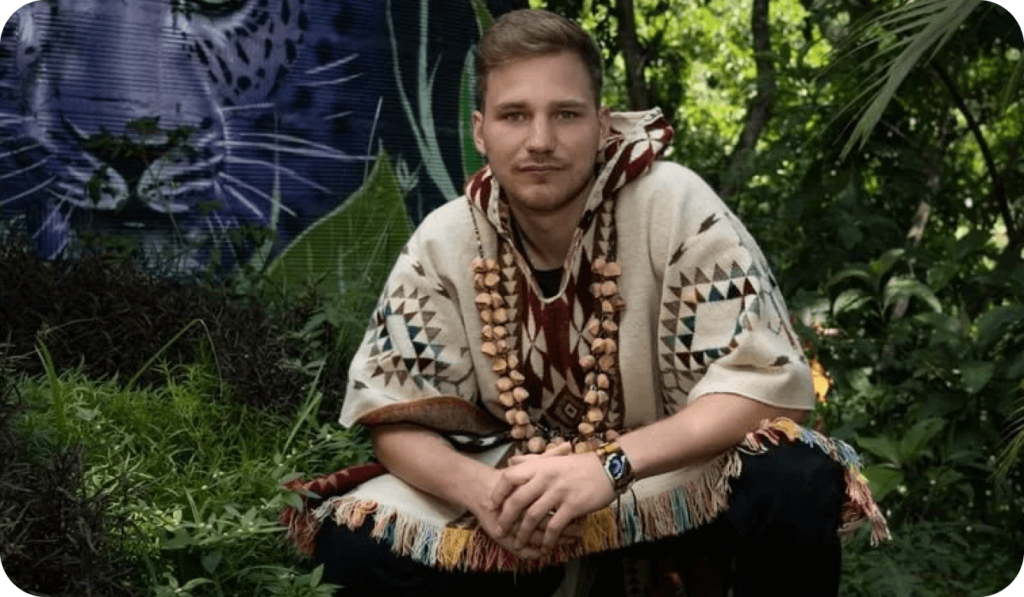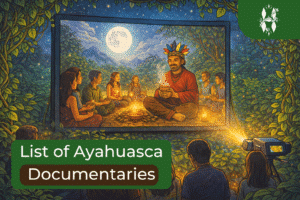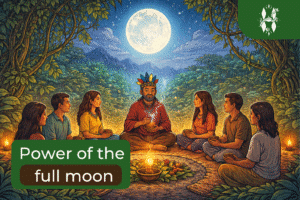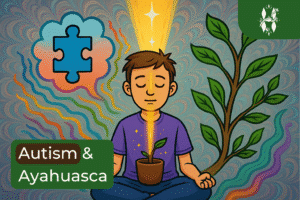Ayahuasca and ADHD: Can Plant Medicine Help With Focus and Self-Understanding?
ADHD can feel like this: you start cleaning the kitchen, find your keys, then end up scrolling TikTok for an hour. Sound familiar? Many people struggle with scattered attention, unfinished projects, and the frustration of not being able to “just focus.” Some start wondering if Ayahuasca might be the answer.
This is my personal journey with ADHD and Ayahuasca – what I’ve learned, what helped, and what still remains a work in progress.
Key takeaways: Ayahuasca and ADHD
- Ayahuasca isn’t a cure for ADHD — but it can support self-awareness, compassion, and emotional regulation, which may ease some of the challenges.
- Preliminary research is promising — early studies show Ayahuasca may reduce ADHD-like symptoms such as inattention and impulsivity, though more clinical evidence is needed.
- Medication safety is critical — stimulant medications like Ritalin or Vyvanse are contraindicated with Ayahuasca. Stopping any ADHD medication must be done gradually and always in collaboration with your doctor.
Table of Contents
Frequently Asked Questions: Ayahuasca and ADHD
Can Ayahuasca cure ADHD?
No, Ayahuasca cannot cure ADHD. What it can do is support self-awareness, compassion, and emotional healing, which may help people manage ADHD symptoms more effectively.
Does Ayahuasca improve focus for people with ADHD?
Some participants report greater focus, presence, and emotional balance after ceremonies. A 2023 pilot study found reductions in inattention and impulsivity, but more research is needed before making strong claims.
Is it safe to drink Ayahuasca if I take ADHD medication like Ritalin or Vyvanse?
No, stimulant medications are contraindicated with Ayahuasca. Combining them can cause dangerous reactions, including hypertensive crises. Medications must be stopped safely under medical supervision before attending a ceremony.
Do I need to stop my ADHD medication before drinking Ayahuasca?
Yes, but how to do so depends on your situation. Tapering must always be guided by the doctor who prescribed the medication, as stopping suddenly can be unsafe.
What other factors influence how Ayahuasca affects ADHD?
Beyond neurochemistry, factors like emotional readiness, environment, integration practices, and support from facilitators all shape the experience.
ADHD: Often Misunderstood and Overtreated
ADHD (or ADD) is often underappreciated, frequently misdiagnosed, and sometimes overtreated. It’s easy to dismiss as “just a lack of focus,” but the condition can profoundly affect daily life and relationships. At the same time, it’s also common to use ADHD as a quick excuse: “I can’t finish things because I have ADHD.”
The truth is more complex – and understanding it fully requires both honesty and compassion.
Why Competitors Often Miss the Deeper Point
Competitor articles often frame ADHD exclusively as a neurological issue. While brain chemistry matters, many ignore the emotional roots and integration practices that are essential for lasting change. By highlighting these, we emphasize that healing ADHD isn’t only about managing attention — it’s also about building emotional resilience and supportive routines.
Find out if Ayahuasca is right for you
- Will you be safe physically and emotionally?
- How will you be supported in the ceremony?
- How do the facilitators handle difficult situations?
- How will you be able to process the experience?
- You want change, but will your life be unrecognizable after Ayahuasca?
+ 13 things to consider before drinking Ayahuasca?
My Story: From Denial to Awareness
For a long time, I brushed it off. “Everybody has ADHD. Social media makes it impossible to focus.” I didn’t want to define myself by a disorder.
But then, a respected friend pointed out that my patterns – 15 half-started marketing projects, dozens of browser tabs open, jumping between tasks – weren’t just normal distractions. When I had energy, I managed. But when my energy dipped, I was overwhelmed and paralyzed.
The book Scattered Minds by Dr. Gabor Maté helped me see ADHD in a new light. It explained not only the symptoms, but also the deeper roots of the condition.
The Role of Personal Stories in Healing ADHD
Competitor blogs typically cite scientific studies but rarely share lived experiences. Our approach combines both: real stories plus evidence-based insights. This balance makes the message more relatable and trustworthy for those exploring Ayahuasca for ADHD.

What Defines ADHD?
ADHD is usually characterized by three traits:
- Poor attention skills
- Impulse control difficulties
- Hyperactivity
But those clinical definitions don’t capture the lived experience — the swings between hyperfocus and total overwhelm, or the constant unfinished business that chips away at self-confidence.
Where Does It Come From?
Science points to several contributing factors:
- Genetic predisposition
- Chemical imbalances in the brain
- Environmental influences
Dr. Gabor Maté highlights the last point: brain development depends on attunement — the emotional connection between infant and caregiver. When attunement is disrupted, the brain’s systems for focus, impulse control, and attention may not develop as strongly. In today’s fast-paced, distracted world, that disconnection is increasingly common.
Dr. Maté’s Solutions for ADHD
Dr. Maté doesn’t see ADHD as a life sentence. His recommendations include:
- Self-awareness and self-compassion — understanding your behaviors without harsh judgment.
- Healing early emotional wounds — addressing unresolved childhood pain.
- Structure and routine — consistent daily patterns to reduce overwhelm.
- Mindfulness and meditation — training attention and emotional regulation.
- Physical activity — supporting brain health through movement.
How Ayahuasca Enters the Picture
So where does Ayahuasca fit into this? From my experience and observation, Ayahuasca can help in several ways:
- Awareness — bringing unconscious patterns into focus.
- Healing — surfacing and releasing old emotional wounds.
- Neurochemistry — Ayahuasca contains beta-carbolines, which can temporarily boost dopamine and create what’s often called the “afterglow”: better emotional regulation, presence, and mindfulness.
- Learning through practice — if I can stay present and grounded while facilitating in an intense Ayahuasca ceremony, it becomes easier to apply that focus in daily life.
POP vs POD: Where We Stand Out
- Point of Parity (POP): Like competitors, we acknowledge Ayahuasca can help with attention, impulsivity, and emotional regulation.
- Point of Difference (POD): We emphasize that these improvements don’t come from the brew alone. They require proper preparation, safe facilitation, and post-ceremony integration — areas where many blogs remain silent, but we consider essential.

What Science Says About Ayahuasca and ADHD-like Symptoms
- Preliminary Study Shows Promise
A 2023 pilot study involving 49 participants at Ayahuasca retreats in Peru found significant reductions in self-reported inattention, hyperactivity, and impulsivity—even among people without formal ADHD diagnoses. ResearchGate - Ayahuasca’s Neurochemical Effects
Ayahuasca contains β-carbolines (like harmine and harmaline) that inhibit MAO, allowing DMT to activate serotonin receptors (5-HT₂A, 1A, 2C) and possibly boost dopamine in key brain areas. SpringerLinkFrontiers
These effects may restore emotional balance, enhance focus, and support regulation—areas often challenged in ADHD. - Mental Health and Neuroplasticity
Systematic reviews suggest Ayahuasca can positively affect depression, anxiety, and overall mental health. MDPIPMC
Additionally, neuroimaging studies hint at increased brain entropy and enhanced connectivity—a pattern linked with creativity, flexibility, and openness to new insight. arXiv
Competitors on Science vs. Our View
Many competitor sites stop at presenting neurochemical data — serotonin, dopamine, and MAOIs. We take it further by showing how these changes must be anchored into daily practices like journaling, therapy, and mindfulness. Science explains why Ayahuasca affects ADHD, but integration explains how those benefits last.
Why ADHD Medications Like Ritalin or Vyvanse Must Be Paused Before Ayahuasca
Stimulant medications commonly used for ADHD—such as methylphenidate (Ritalin) or lisdexamfetamine (Vyvanse)—are contraindicated with Ayahuasca. These medications increase norepinephrine and dopamine levels in the brain and, when combined with the monoamine oxidase inhibitors (MAOIs) found in Ayahuasca, can dangerously overstimulate monoamine pathways.
- Research into interactions between stimulants and MAOIs warns of serious risks like hypertensive crises—potentially life-threatening spikes in blood pressure (PMC).
- Clinical guidelines and operator protocols across retreats consistently advise that any stimulant use must be cleared from your system before drinking Ayahuasca. In fact, medications that are clear MAOIs or that influence central nervous system stimulants are contraindicated and must be tapered off under medical supervision).
Because each person’s medication history, dosage, and long-term plan are unique, tapering off stimulants is not a one-size-fits-all process—you must always collaborate closely with your prescribing physician. They’ll help determine the appropriate time frame and ensure your nervous system is stable before participating in an Ayahuasca ceremony.
Preparing for Ayahuasca safely goes beyond medication—it also includes the way you care for your body, mind, and spirit before ceremony. Setting a clear intention and following proper preparation guidelines will ground your process and help you receive the medicine in the best possible way.
My Personal Take
Do I want to “heal” my ADHD completely? Not entirely. There are parts of it I appreciate:
- The childlike creativity and freedom.
- The ability to hyperfocus and make rapid progress.
- The escape into imagination when situations feel stifling.
But there are also limits:
- Leaving too many projects unfinished.
- Sabotaging myself by avoiding responsibilities.
- Hundreds of unanswered messages piling up.
Ayahuasca hasn’t magically solved ADHD for me. But it has helped me recognize my patterns, create structures, and develop more compassion for myself. I’m learning to balance my visionary side with team members who bring finishing energy, and to choose healthier sources of dopamine — like sports or completing tasks — instead of endless scrolling.
If you feel called to explore this path yourself, you can learn more about our retreats in Colombia and the way we support healing journeys at Harmonica Retreat on our main site: Ayahuasca-Retreat.com.
Conclusion
Ayahuasca won’t “cure” ADHD. But it can support the journey by helping you:
- Understand yourself more deeply
- Cultivate compassion
- Strengthen mindfulness
- Reconnect with your body
And all of this can ease the challenges of ADHD. Still, it’s a process, not a pill. The medicine doesn’t erase the condition, but it can help you live with more balance and awareness.
Closing Reflection vs Competitors
Competitor blogs often end with “Ayahuasca may help ADHD.” We go further by clarifying that it is not a cure, but a support system that encourages deeper self-awareness, compassion, and balance. This distinction makes our content more responsible and aligned with both medical guidance and lived reality.





